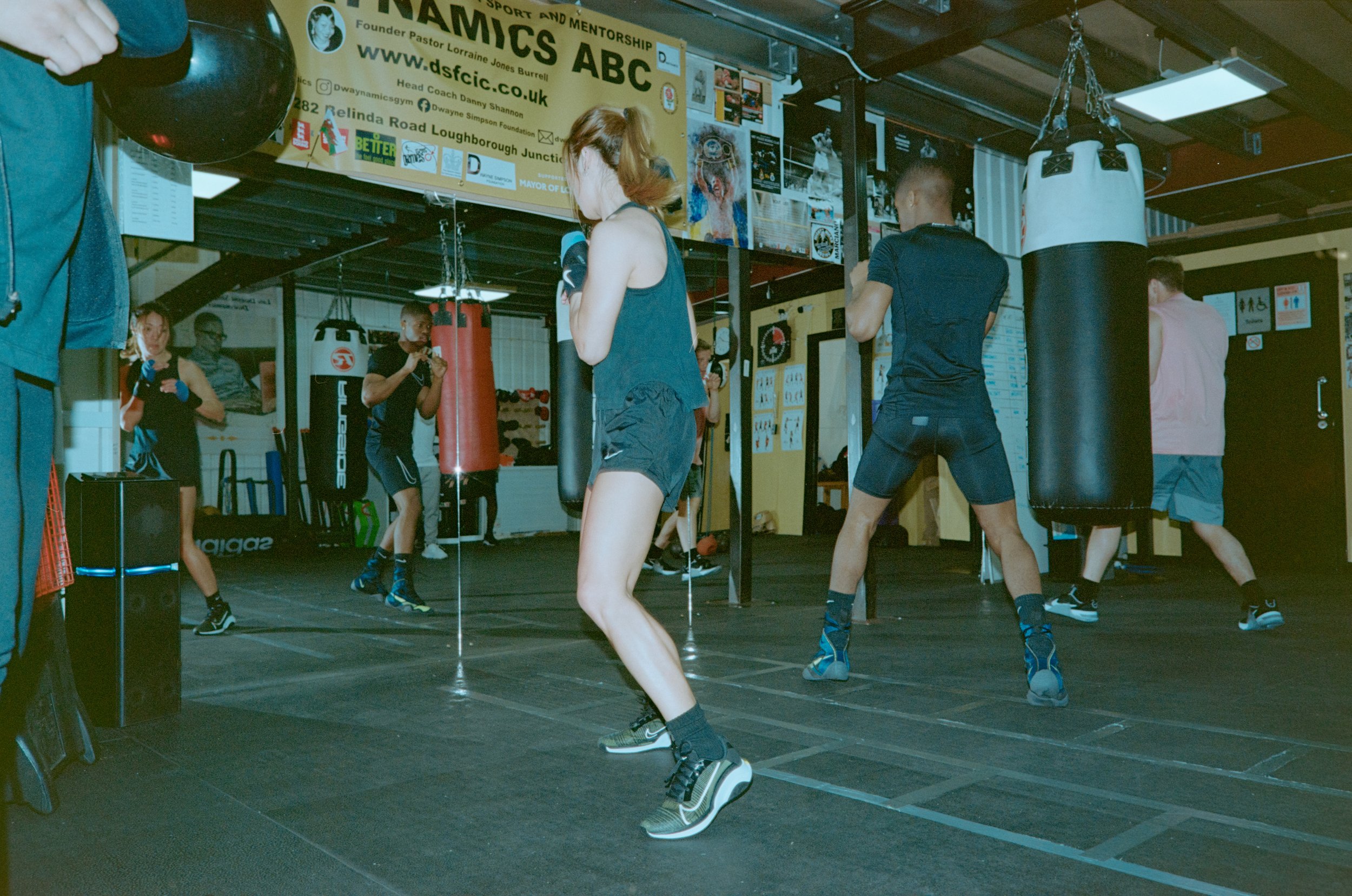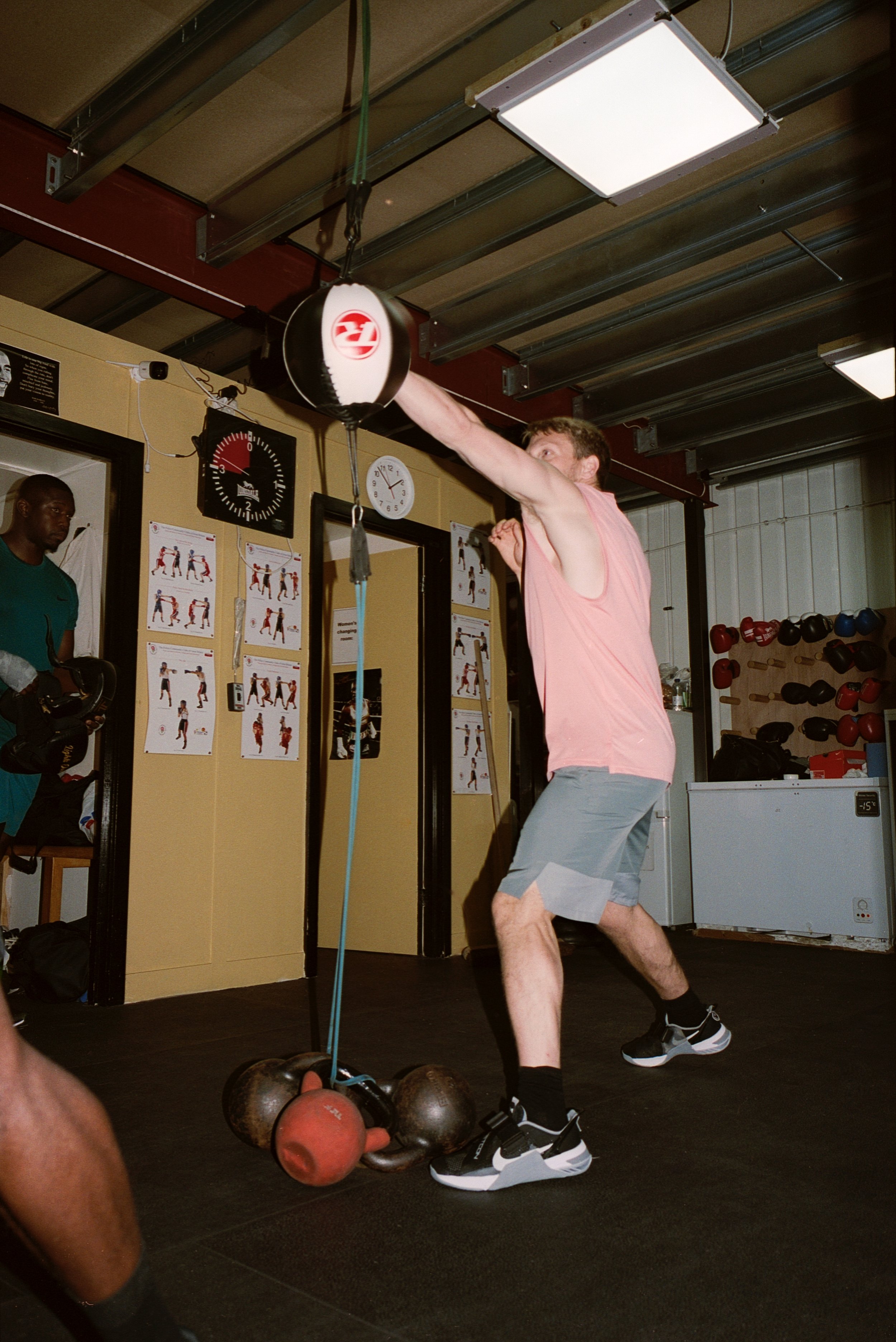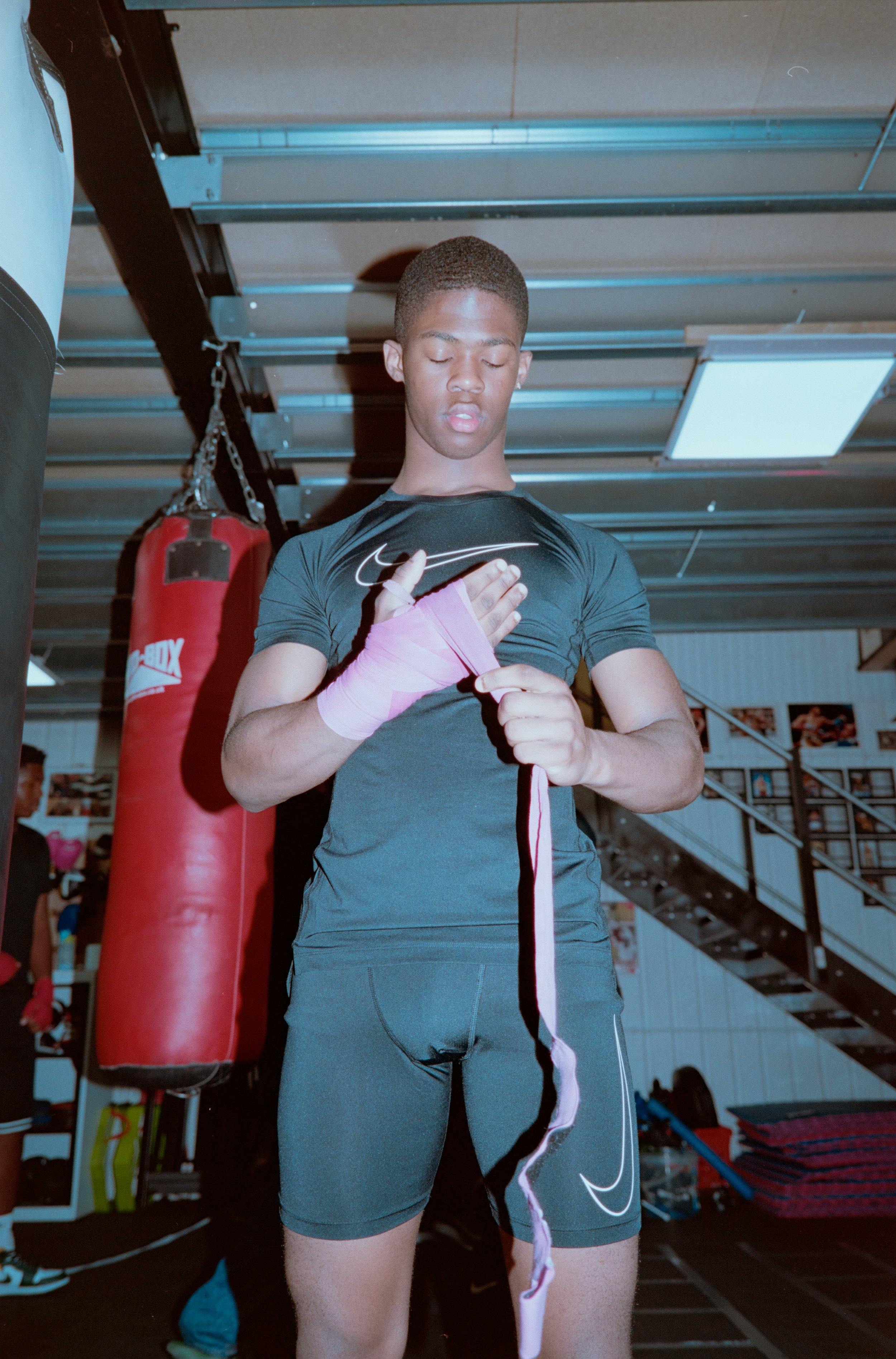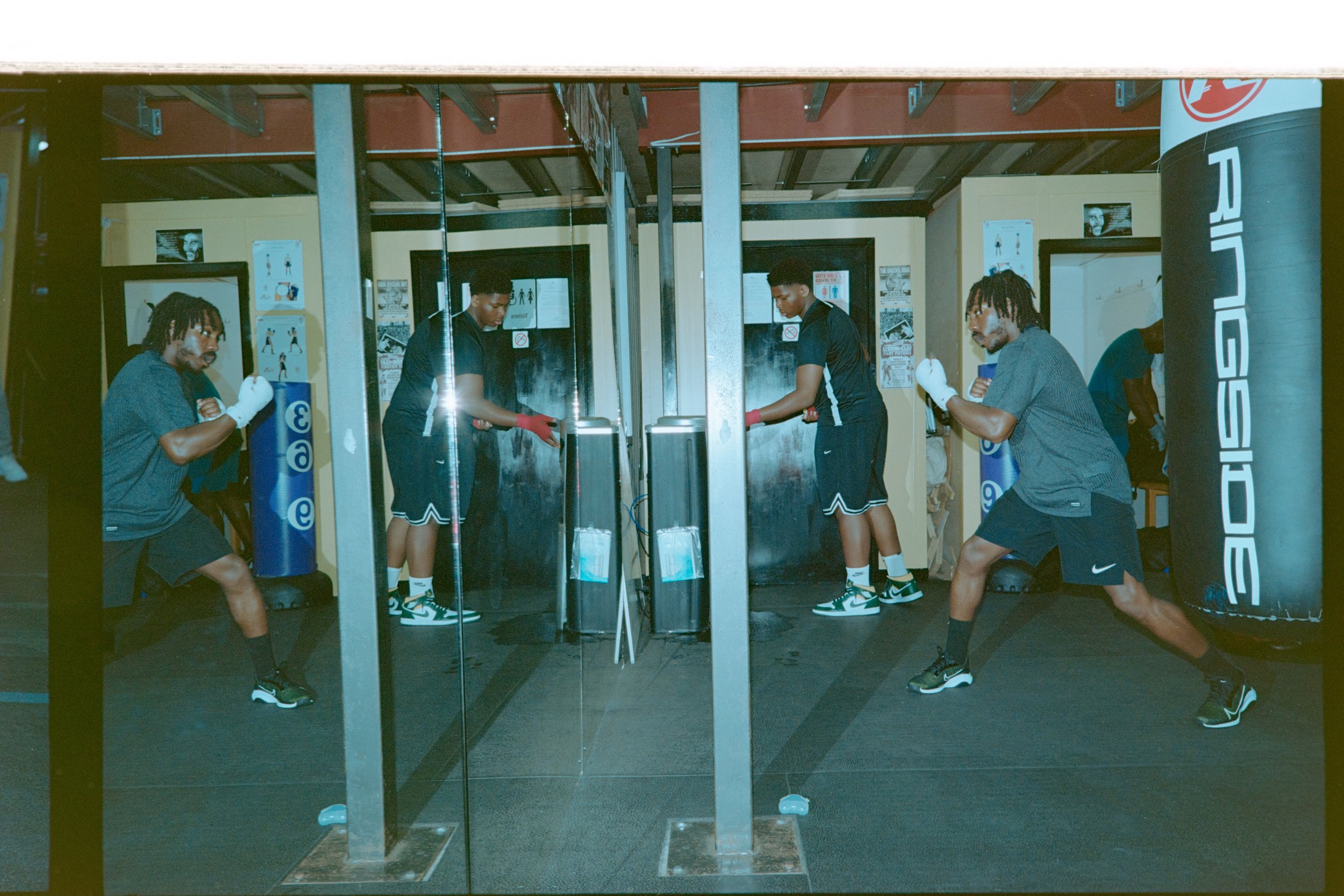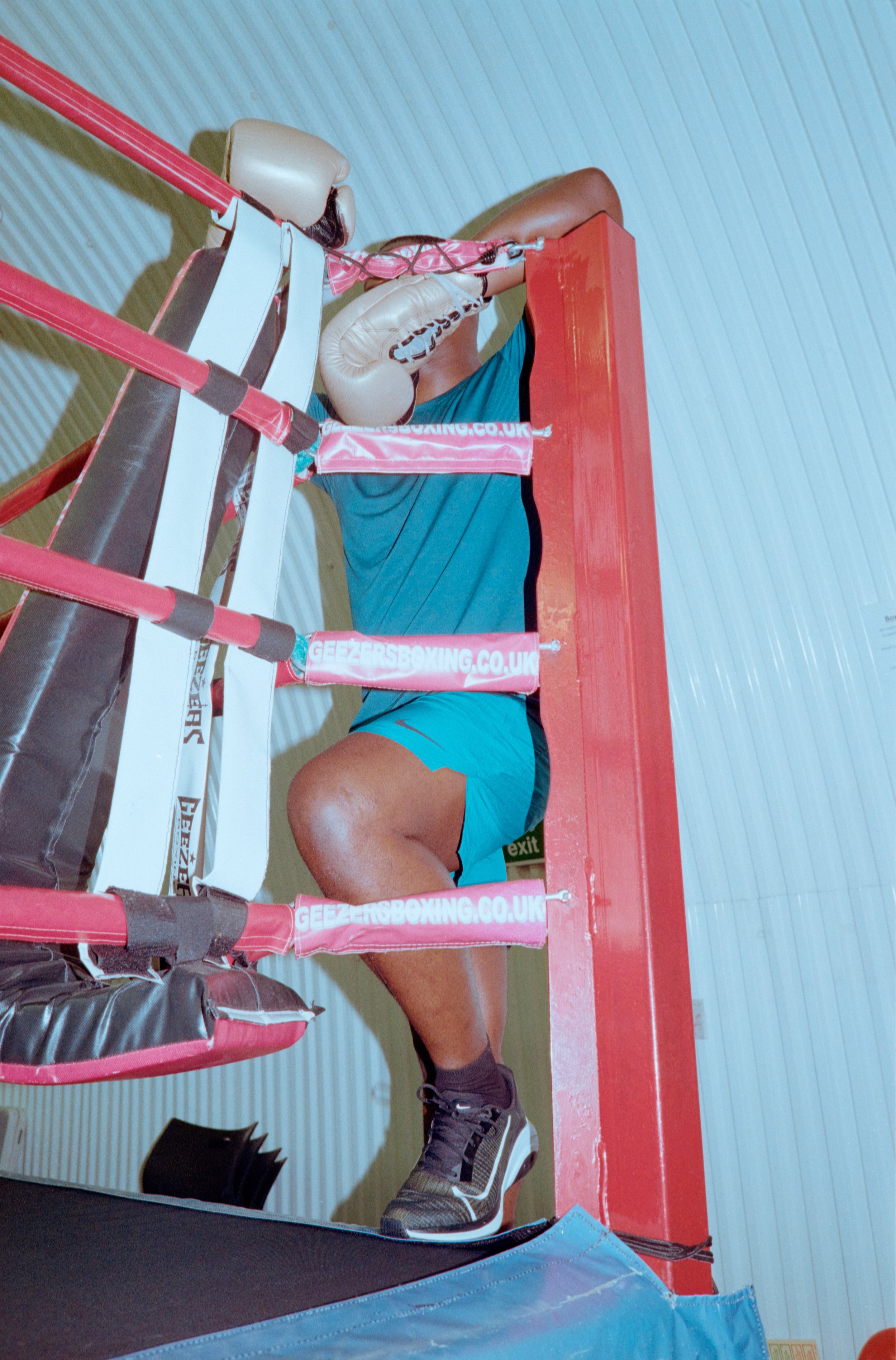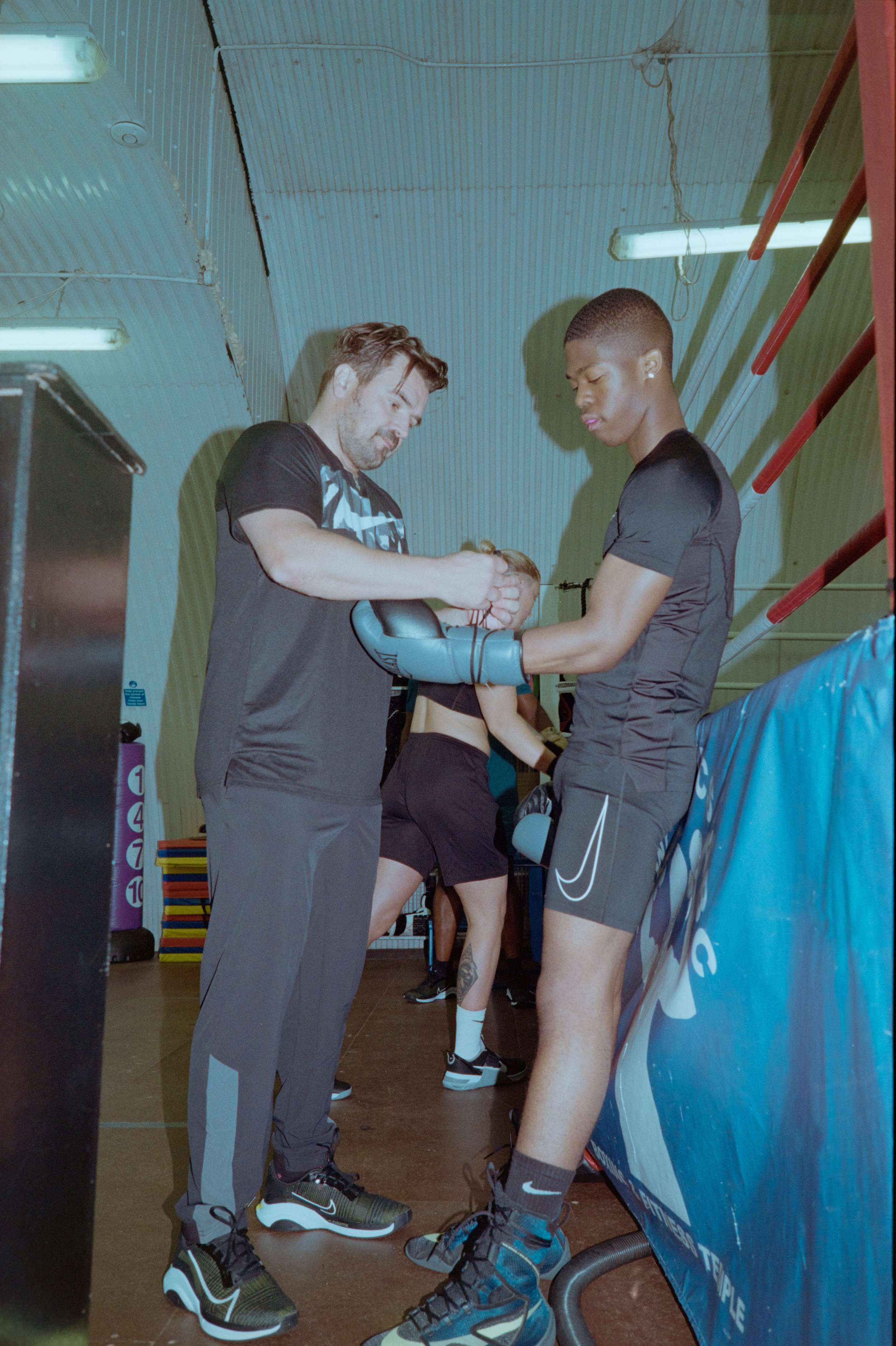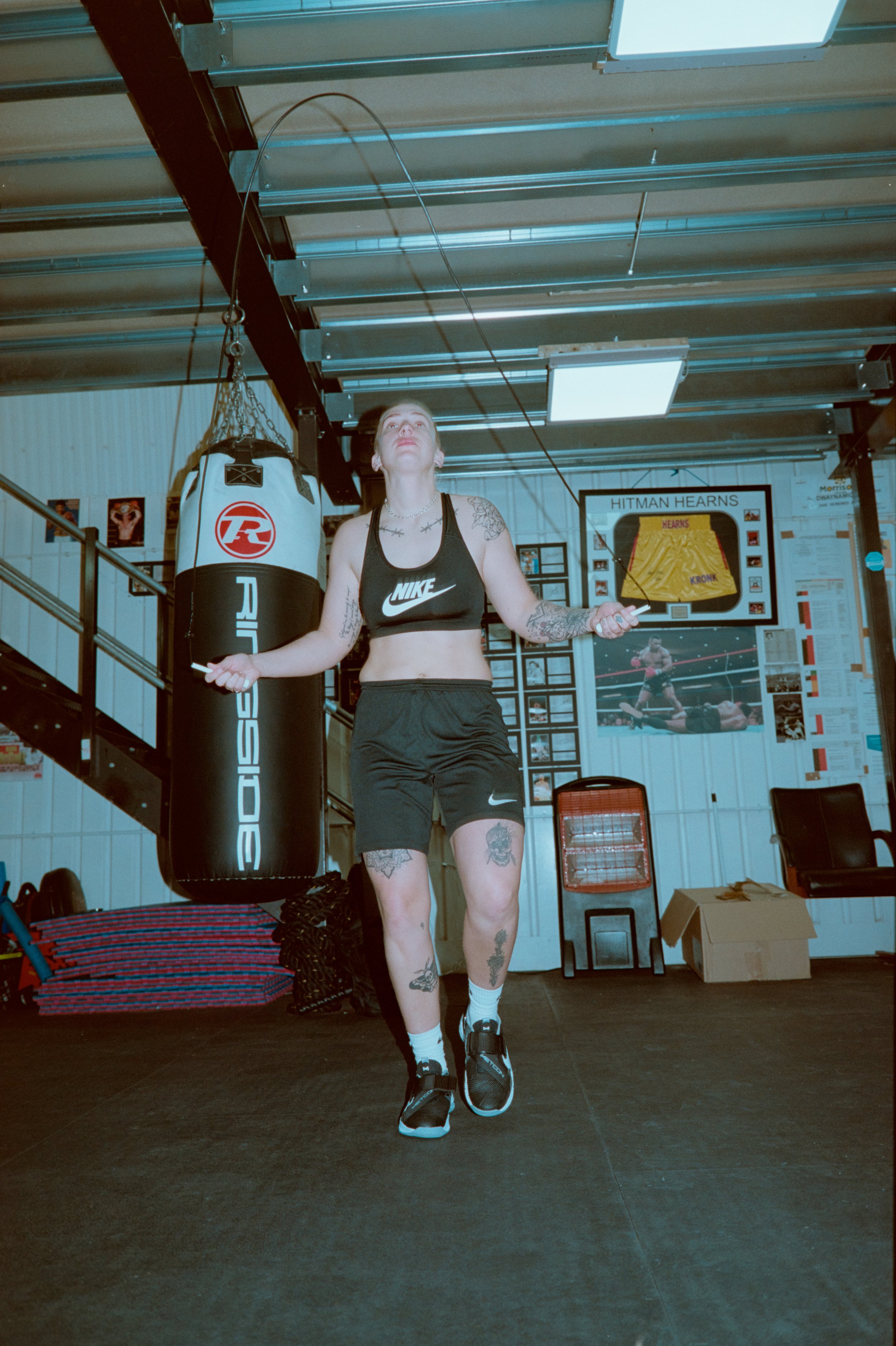Fighting With More Than Just Punches
Dwaynamics is the south London based boxing gym that contributes more to its community than just fitness training. With its Nike supported Dwaynamics ABC project, the gym aims to bring the lessons learned from boxing to children’s and youth spaces.
Organisation: @dwaynamicsgym @dwaynamicsdsf
Photographer: @jessicamadavo
Creative Director: @roena
Creative Lead & Stylist: @jermainerrobinson
Interviewer: @tashaabramson
In collaboration with creative agency: @vibecalledtech @lewisdaltongilbert
Special thanks to: @nikelondon
Stepping into Dwaynamics, I’m met with a colour scheme of black and yellow. Glittery yellow curtains drape one wall, a whiteboard of leadership rankings adorn another, while signature-signed photos from major boxers including Muhammad Ali decorate a third.
It is difficult to overstate just how busy and alive the space feels inside. While boxers punch through their drills with focused precision, others are talking to their coaches and mentors.The atmosphere is one of quiet but strong positive energy. You know these boxers mean business. They’re a family that works towards bettering themselves and each other.
The Dwaynamics boxing centre is a charity that works to break down the challenges crime presents in Brixton. The history of Dwaynamics goes right back to its founding in 2014, when Dwayne Simpson, a boxer himself, opened the gym as a deterrent from crime in his local area. Sadly, he passed away the same year after becoming the victim of a stabbing; however, his mother, Lorraine Jones, a pastor known as Pastor Lorraine by the gym members, has continued the legacy of the gym under her son’s stride, choosing to do this in collaboration with the Metropolitan Police and using it as an opportunity to form positive relationships between police and locals.
The Dwaynamics ABC project is the latest venture by the boxing gym. Backed by the Nike London Grant Initiative, the project aims to give at-risk children between the ages of five and eleven the opportunity to discover no contact boxing. Children who have benefitted from the project include one child, who overcame his stammer after developing his confidence at the gym, and another child, who is a wheelchair user, who is (happily) encouraged to get out of their chair, and helped to stand to train. While some may have physical disabilities or learning disabilities, the gym makes it fun for these children to socialise and workout, and acts as an inclusive and welcoming space.
The Nike London Grant Initiative supports 15 organisations for up to 12 months around London in doing good work through sports and development opportunities in the fight against racism’s systematic problems, which create inequality and disadvantageous challenges for the Black community. It is through work like this that Nike hopes to “refine the company-wide grassroots strategy for serving Black communities across the world.”
Speaking to all the different members of this community – the children, the coaches and even the police officers who are members too – it is clear that this grassroots energy is alive here. Boxing, as one person tells me, is more than just throwing a punch. You have to coordinate your hands and feet; you have to discipline yourself and learn to take instructions. Your endorphins kick in as soon as you start exercising.
Natasha Abramson: Why did you join Dwaynamics?
Isaak: I started boxing because of my anger problem. It’s helped me with my temper. I went to prison 3 years ago – at 23 years old – for two years.
Natasha: How has Dwaynamics helped?
Isaak: Dwaynamics is a good place to be. Growing up in South London you don’t really mingle with the police because of stop and search experiences, being stopped in unlawful ways. You form a stereotype and you start to judge. But coming here, you don’t see the officers in their uniform and you get to see them for who they are. They’re just normal people who want to train, and they’ve got lives as well. I feel I’m in a better place and I’m more mature, because I don’t judge without knowing someone; as a young Black man walking in South London getting targeted by police and, similarly, with the stereotype of a policeman targeting whichever Black man he can find. I now know they are just corrupt police, and I’m more at peace. I’m not a threat to someone, and they’re not a threat to me.
Natasha: How does the gym impact the community?
Stephanie, head female coach: Being a community gym, Lorriane is always in the community. It impacts us, because we invite everyone here and get everyone involved in the gym. Boys, children, or young people having issues come to Dwaynamics. We help them, and having the police involved helps them too. It really does impact their life; it really does change them. They’ve got a focus, a reason to get off the streets. It’s like, “You got frustrations? Then come down to the gym, work it out.” Sometimes I sit them down and talk to them about what they’re doing away from the gym. There’s always a mental element, it is more than just physical. You’re also giving them a career path – you’re helping them to become athletes. They go to competitions and fights, and it builds them.
Natasha: How did you get into personal training?
Stephanie: My confidence before becoming a personal trainer was quite low. I went to prison for about 16 months and was then reintegrated into society. As a religious person, personal training was something I never thought I’d do. I just fell into it. I began training and that gave me so much confidence, because now my body was looking great. I started becoming a boxing coach and speaking to people I don’t know, and that’s a problem. But it worked, and I was doing it and meeting people I didn’t know. Talking to strangers on the phone, handing out my leaflets and promoting myself. I don’t see myself as a teacher, but now I’m teaching people.
My food was different in prison – I was able to train three or four times a day. I was eating fresh food. It was negative because I wasn’t around my kids, but it was positive because I was able to eat right, I was able to pray more, I was able to read books I hadn’t read.
I can relate to young people more. When you say to people “I know where you’ve been,” I’m like, “Do ya?” But I’ve come out on the other side. I’ve been able to do this, and I’ve been able to help children. It made the journey worth it. Dwaynamics has made a difference in my life. What more could I ask for?
Natasha: How does boxing help you?
Stephanie: Boxing makes me feel stronger – it makes me feel that if I was in a situation where I needed to defend myself then I could. Dwaynamics has given me such an opportunity to grow and be myself. Lorraine (the pastor) being a woman herself, and boxing being a male-dominated and oriented sport means that while sometimes you don’t feel confident coming in, you are supported by the nature of a female-owned gym.
The interaction of police with the community is seen as a positive connection by everyone. Julia, a police officer, talks to me about it from her perspective.
Soon I meet the Head Coach, Danny Shannon, who used to have a very high-impact role as a police officer in the TSG (Territorial Support Group). Danny is a strong, confident leader, who mentors and coaches both the younger and more experienced boxers. His coaching led Julia to become the number one boxer in the country.
Natasha: When did you join the police and why did you join the gym?
Julia: I joined the police last June, but I’ve wanted to be in the police since I was a kid. The magic of this gym is that you don’t know who is police and who isn’t, and that’s amazing. The fact that you can’t tell officers and normal people apart in a place like Brixton is a shocking thing, and in a good way! I’ve actually ran into kids on the street whilst on my job, out and about. In those moments I realise I have my police kit on and everyone can see I’m police; but this is a Black kid, completely local, who immediately has his barrier down because they’re like “I know her, she’s a boxer.”
Natasha: How has Dwaynamics affected you as a police officer?
Julia: When you’re out on the street there’s a wariness that anything can happen whilst on the job; but this community gym allows you to look at people differently, and they look at you differently. After all, we’re just people going about our business.
Breeze, police officer since 2019: I think it’s really good; the fact that we’re police officers engaging with the community, getting kids off the street, and the whole reason this gym started in the first place. Here, everyone respects each other.
Natasha: What’s so good about this gym?
Danny, Head Coach: The ring never lies. You’ve got to respect each other in the ring, whether you’re a police officer or not. I was a little apprehensive bringing police officers and community members together in the gym, because of the relationship that the police have with the community in Brixton; but everyone respects each other. When you’re sparring with someone you develop a mutual respect no matter who they are, and the police respect that just as much as the community members. On top of that, we get youth turning up at our gym from parents, police, youth offending, and a plethora of other organisations. There has been such high demand that we are now open six days a week, up from three.
Natasha: Why did you decide to open the amateur classes six to seven days of the week?
Danny: The amateur classes, while meant to be open three days a week, are now open six to seven days a week. Parents used to call asking if the classes were on, because they were worried about their kids getting into trouble on the streets – so I just keep it open every day.

